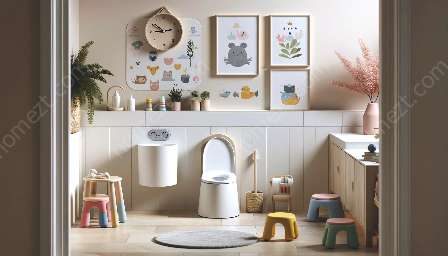Teaching proper hygiene habits is essential for children’s health and well-being. It is crucial to introduce these practices in a way that is engaging and practical, especially in the contexts of potty training and nursery & playroom settings.
The Importance of Proper Hygiene Habits
Proper hygiene habits are fundamental for preventing the spread of germs and illnesses. Teaching children about good hygiene practices from a young age can establish lifelong habits that will help keep them healthy.
Creating a Hygiene-Friendly Environment
When it comes to potty training, ensuring that the bathroom is a clean and inviting space is important. Providing colorful soap and child-friendly sinks can encourage children to wash their hands thoroughly after using the toilet.
In nursery and playroom environments, it’s important to have accessible handwashing stations and child-sized bins for disposing of used tissues and other waste. This creates an environment that promotes good hygiene practices.
Engaging Learning Activities
Make learning about hygiene fun by incorporating engaging activities. Use interactive games, songs, and storytelling to teach children about the importance of washing hands, covering their mouths when sneezing, and using the potty appropriately.
Provide age-appropriate books and posters that illustrate proper hygiene habits in a way that is appealing and understandable for young children.
Consistent Reinforcement
Consistent reinforcement of good hygiene practices is crucial. Establish routines for handwashing, toilet use, and cleaning up toys and play areas. Encourage children to take ownership of their hygiene by providing them with their own personalized hygiene kits containing items such as their toothbrush, hand sanitizer, and a small towel.
Leading by Example
Adults and caregivers play a significant role in modeling good hygiene habits for children. When children see adults practicing proper hygiene, they are more likely to emulate these behaviors.
Encourage caregivers and educators to demonstrate proper handwashing techniques, sneezing etiquette, and toilet use so that children can learn from their example.
Positive Reinforcement
Recognize and praise children for practicing good hygiene habits. Positive reinforcement, such as stickers or verbal praise, can motivate children to continue following these routines and establish lifelong habits.
Conclusion
Teaching proper hygiene habits in the contexts of potty training and nursery & playroom environments is crucial for children's overall well-being. By creating a hygiene-friendly environment, incorporating engaging learning activities, and providing consistent reinforcement, children can develop positive hygiene habits that will benefit them for a lifetime.


